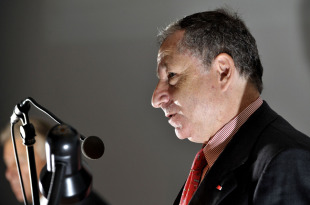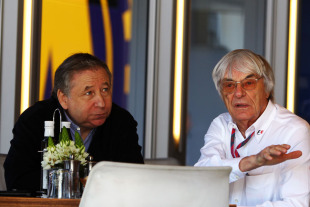
- News:
-
No winners in Bahrain debacle - Whitmarsh
- News:
-
Bahrain GP cannot go ahead - Ecclestone
- News:
-
Teams stand up against FIA
- News:
-
Bahrain GP won't happen - Mosley
- News:
-
Todt breaks cover to defend FIA decision
- News:
-
Ecclestone makes Bahrain U-turn
- Drivers:
- Bernie Ecclestone
- |
- Jean Todt
Jean Todt, the FIA president, never had a reputation as a slick political player or a great communicator. When he replaced Max Mosley - who was both these things - he was seen as a solid pair of hands to run world motorsport. But events of the last few days have left him looking weak and remote, refusing to tackle any moral issues or to explain why the FIA has been so determined to reinstate the Bahrain Grand Prix.
Todt's profile ever since the first reports of unrest started emerging from Bahrain has been of the lowest profile. Until this week, when he was stung into reaction by the ferocity of the criticism of the FIA's decision last Friday, he has been almost invisible. Some believed he was retaining a dignified aloofness. Others that he was dodging the issue.
In the build-up to last Friday's vote, reports of human rights abuses continued to emerge from Bahrain at the same time the authorities there engaged in an expensive international PR war to try to convince those that mattered all was well. Even ESPNF1 has been targeted - skillfully and subtly - by those urging us to believe life is peaceful in Bahrain. Only when digging into backgrounds has it emerged time and time again these independent sources are anything but. In the event, few believed the propaganda other than those running the sport.
Todt's personal fallibilities were exposed in interviews he gave on Monday where his defence of a laughably naive FIA report lacked any credibility. Like the Bahrain authorities themselves, he seemed to think that rubbishing any negative reporting on the kingdom meant his position was justified. They are all wrong, we are right, was the message. Speaking on a day when 47 doctors and nurses went on trial in Bahrain for treating injured protestors, all it did was ensure he came across as arrogant.
If that was a communications failing, then ignoring strong messages coming from the teams themselves that they were not willing to extend an already bloated season to accommodate Bahrain showed his lack of political acumen. As did moving the Indian Grand Prix by six weeks, causing considerable disruption to the organisers who had been planning for the inaugural race for several years, not to mention teams, sponsors and fans who had already made arrangement to be in Delhi at the end of October.
Ironically, it was Mosley who skilfully and eloquently exposed Todt's failings. Firstly, he dissected the FIA report, by merely mentioning it was compiled by "a very, very nice man called Gracia, who speaks no English and as far as I know speaks no Arabic and was then taken around by the representatives of the government and, of course, has no knowledge of what was really going on".
Then came the coup de grace, when he quietly pointed out the FIA had no authority to change the calendar without the unanimous support of the teams. From that moment on, it was clear the FIA had exceeded its own powers in its desperation to restore the Bahrain Grand Prix.
Bernie Ecclestone, meanwhile, showed he was as good a political player as Todt seems to be bad. On Friday he voted for the changes, but by Monday, faced with public, sponsor and team opposition, he did a dramatic and very public about-turn. Almost as soon as Todt had finished his interview, Ecclestone called for a fresh FIA vote. By that evening Ecclestone was, incredibly, the good guy while Todt was left to play the pantomime villain.
Todt's failure to satisfactorily explain how the FIA voted made him look weak and evasive. Originally announced as a unanimous vote, Todt was forced to admit three days later he did not know exactly how many people had voted in favour of the proposal. Given the importance of the meeting and the fact that is was obvious there would be a backlash of some kind, it seems inconceivable someone like Mosley would not have ensured it was carried out in such a way there was no ambiguity and everything was documented. Todt just came out with bluster and lacked the detail crucial to him looking in charge.

All this leaves the question of why the FIA was so desperate to reinstate the Bahrain Grand Prix. To most people, it's simple. Money and mates. The FIA is now perceived more than ever as a modern old boys' club, where cash - in this case the Bahraini royal family's - can buy you anything.
Unfortunately for Todt, his position is not helped by the close association between his son, Nicolas, and the Bahrain authorities who co-own his GP2 team. There is no suggestion that relationship influenced Todt senior, but it's something that will keep being brought up.
Over the years Ecclestone and Mosley have weathered all that has been thrown at them and come out the other side. That's because of their ability and their acute awareness of when to fight and when to change tack. They may not be universally popular but they have their fingers on the pulse of the sport.
Todt's failure to come close to grasping what the public and his own sport were saying has tarnished his reputation. The image of Formula One has also been damaged.
What he needs to do now is explain why he and the FIA got this so badly wrong and why Bahrain is so important to the Formula One. Saying nothing and hiding away in meeting rooms with the chosen few is no longer acceptable.
Martin Williamson is managing editor of digital media ESPN EMEA
© ESPN Sports Media Ltd.
 Martin Williamson is managing editor of digital media ESPN EMEA Martin Williamson, who grew up in the era of James Hunt, Niki Lauda and sideburns, became managing editor of ESPN EMEA Digital Group in 2007 after spells with Sky Sports, Sportal and Cricinfo
Martin Williamson is managing editor of digital media ESPN EMEA Martin Williamson, who grew up in the era of James Hunt, Niki Lauda and sideburns, became managing editor of ESPN EMEA Digital Group in 2007 after spells with Sky Sports, Sportal and Cricinfo

